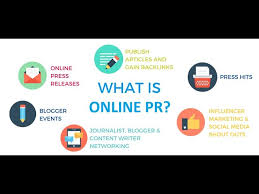Maximising Online Public Relations Impact in Digital Marketing Strategies
The Role of Online Public Relations in Digital Marketing
In today’s digital age, online public relations (PR) plays a crucial role in the success of any digital marketing strategy. With the rapid growth of the internet and social media platforms, businesses have more opportunities than ever to connect with their target audience and build brand awareness.
Online PR involves managing a company’s reputation and relationships with its stakeholders through various online channels. This includes engaging with customers on social media, responding to reviews and comments, and creating compelling content that resonates with the target audience.
Benefits of Online PR in Digital Marketing
Enhanced Brand Visibility: By leveraging online PR strategies, businesses can increase their visibility and reach a wider audience. Engaging with customers on social media platforms allows companies to showcase their brand personality and values.
Building Trust and Credibility: Effective online PR helps businesses build trust and credibility with their audience. By providing valuable content, responding to customer inquiries promptly, and addressing any issues transparently, companies can establish a positive reputation online.
Driving Website Traffic: Online PR activities such as press releases, guest blogging, and influencer collaborations can drive traffic to a company’s website. This not only increases brand exposure but also helps improve search engine rankings.
Key Strategies for Successful Online PR in Digital Marketing
To harness the power of online PR in digital marketing effectively, businesses should consider implementing the following strategies:
- Social Media Engagement: Regularly interact with followers on social media platforms by responding to comments, sharing relevant content, and running engaging campaigns.
- Influencer Partnerships: Collaborate with influencers in your industry to reach a larger audience and leverage their credibility to enhance your brand image.
- Email Marketing Campaigns: Use email marketing to communicate directly with your target audience, share updates about your business, promotions, or events.
- Crisis Management Plan: Be prepared for any potential negative publicity by having a crisis management plan in place to address issues swiftly and effectively.
In conclusion, online public relations is an essential component of any successful digital marketing strategy. By focusing on building relationships with customers, enhancing brand visibility, and maintaining a positive reputation online, businesses can create a strong foundation for growth and success in the digital landscape.
Maximising Brand Impact: The Advantages of Online Public Relations in Digital Marketing
- Enhanced brand visibility through online presence
- Opportunity to engage directly with target audience on social media platforms
- Cost-effective way to reach a wide audience compared to traditional PR methods
- Ability to monitor and track online PR efforts in real-time for instant feedback
- Build trust and credibility with stakeholders through transparent communication online
- Drive website traffic and improve SEO rankings through strategic online PR activities
Challenges in Online Public Relations: Navigating Information Overload, Negative Feedback, Control Issues, and Measurement Difficulties
- 1. Information Overload
- 2. Negative Feedback Amplification
- 3. Lack of Control
- 4. Measurement Challenges
Enhanced brand visibility through online presence
Enhanced brand visibility through online presence is a key advantage of online public relations in digital marketing. By actively engaging with customers on social media platforms, sharing valuable content, and showcasing the brand’s personality and values, businesses can significantly increase their reach and exposure. A strong online presence not only helps in reaching a wider audience but also allows companies to establish a distinct identity in the competitive digital landscape. Through effective online PR strategies, businesses can ensure that their brand remains visible and relevant to their target audience, ultimately contributing to increased brand awareness and recognition.
Opportunity to engage directly with target audience on social media platforms
One significant advantage of online public relations in digital marketing is the opportunity it provides for businesses to engage directly with their target audience on social media platforms. By actively participating in conversations, responding to comments, and sharing relevant content, companies can establish a more personal and interactive relationship with their customers. This direct engagement not only helps in building brand loyalty but also allows businesses to gather valuable feedback, address customer concerns promptly, and tailor their messaging to better resonate with their audience’s preferences and interests.
Cost-effective way to reach a wide audience compared to traditional PR methods
Online public relations in digital marketing offers a cost-effective way to reach a wide audience compared to traditional PR methods. By leveraging online channels such as social media, websites, and email campaigns, businesses can connect with a larger and more targeted audience at a fraction of the cost of traditional PR tactics like print ads or TV commercials. This affordability allows companies of all sizes to amplify their brand message, engage with customers on a global scale, and drive meaningful results without breaking the bank.
Ability to monitor and track online PR efforts in real-time for instant feedback
The ability to monitor and track online PR efforts in real-time for instant feedback is a significant advantage of incorporating online public relations into digital marketing strategies. By leveraging analytics tools and monitoring platforms, businesses can gain valuable insights into the performance of their PR campaigns instantly. This real-time feedback allows companies to make data-driven decisions, quickly identify what is working well and what needs improvement, and adjust their strategies accordingly to maximise effectiveness and engagement with their target audience.
Build trust and credibility with stakeholders through transparent communication online
One significant advantage of online public relations in digital marketing is the ability to build trust and credibility with stakeholders through transparent communication online. By engaging in honest and open communication on digital platforms, businesses can establish a positive reputation and foster trust among their audience. Transparency in addressing customer inquiries, sharing authentic content, and handling feedback demonstrates a commitment to integrity and builds credibility for the brand. This transparent approach not only strengthens relationships with stakeholders but also helps differentiate the business in a crowded digital marketplace, ultimately leading to increased loyalty and positive brand perception.
Drive website traffic and improve SEO rankings through strategic online PR activities
By strategically implementing online public relations activities, businesses can effectively drive website traffic and enhance their SEO rankings. Engaging in activities such as press releases, guest blogging, and influencer collaborations not only increases brand visibility but also directs more visitors to the company’s website. By generating quality backlinks through these PR efforts, businesses can improve their search engine rankings, making it easier for potential customers to discover their website and offerings. This proactive approach to online PR not only boosts website traffic but also contributes to long-term success in the competitive digital marketing landscape.
1. Information Overload
In the realm of online public relations in digital marketing, one significant con is the issue of information overload. The sheer volume of online content and the multitude of platforms available make it increasingly difficult for businesses to stand out and engage their target audience. With so much noise competing for attention, capturing and retaining the audience’s interest has become a daunting task. This oversaturation of information can lead to messages getting lost in the digital clutter, making it a constant challenge for businesses to deliver their key messages effectively and make a lasting impact on their audience amidst the overwhelming abundance of online content.
2. Negative Feedback Amplification
Online PR in digital marketing can present a significant challenge in the form of negative feedback amplification. In the online realm, negative feedback or criticism has the potential to spread rapidly and reach a wide audience, posing a threat to a company’s reputation. If not addressed promptly and effectively, such negativity can escalate and cause lasting damage to a brand’s image. It is crucial for businesses to have robust strategies in place to monitor and manage negative feedback proactively, demonstrating transparency and addressing concerns swiftly to mitigate any adverse impact on their reputation.
3. Lack of Control
In the realm of online public relations in digital marketing, a significant drawback is the lack of control that businesses may face. The proliferation of user-generated content and social media conversations means that companies can struggle to dictate the narrative surrounding their brand. Public perception can be shaped independently by users, making it challenging for businesses to maintain complete control over how their brand is portrayed online. This lack of control highlights the importance of actively monitoring and engaging with online conversations to address any potential misconceptions or negative feedback effectively.
4. Measurement Challenges
One significant drawback of online public relations in digital marketing is the challenge of measurement. Evaluating the success and impact of online PR initiatives in terms of return on investment (ROI) and brand reputation can be intricate due to the intangible nature of online interactions. Unlike traditional PR methods where metrics like media coverage or event attendance are more straightforward to measure, quantifying the impact of social media engagement, content sharing, and online conversations on brand perception can be elusive. This lack of concrete data can make it difficult for businesses to determine the true effectiveness and value of their online PR efforts, hindering their ability to make informed decisions and optimise their digital marketing strategies effectively.







